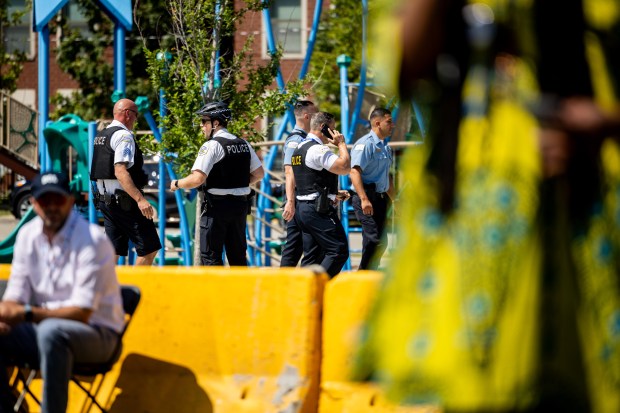As the afternoon sun beat down outside the United Center, where delegates, volunteers and workers mingled about for the Democratic National Convention, Jumoke Ifetayo and Miranda Alexandria were stuck waiting in a nearly empty park.
The activists from the National Coalition of Blacks for Reparations in America were there to give speeches on the necessity of including reparations for slavery in the Democratic Party platform. But the member of their organization who had filled out the online application for the right to speak wasn’t there, violating a rule of the city-provided “Speaker’s Platform.”
City officials blocked Ifetayo and Alexandria when trying to enter the concrete box surrounding the stage and instead had the duo complete a separate paper form attached to a clipboard to speak in the next slot: an hour later.
So the two paced around in the grass, scrolling on their phones and looking over to where dozens of Chicago Police Department officers stood watching. Eight uniformed security guards and a yellow concrete barrier protected the stage that was being used and watched by no one.
“People coming up to spaces like this and this is what they see,” Alexandria said. “It feels like a trap.”
In an effort to show its support for free expression, the city had opened up its speech platform at Park No. 578 during all four days of the DNC, constructing a stage with a microphone and industrial amplifiers pointed toward the parking lots of the United Center. Speakers needed to get preapproved for their 45-minute slots, although day-of sign-ups for empty slots were accepted.
Though all but three of the 24 slots were booked, many speakers this week haven’t shown up for their designated times. As protests spilled into the park on Monday, only a single group delivered a speech on the stage, according to officials with the city’s Office of Emergency Management & Communications.
On Tuesday and Wednesday, an eclectic group of speakers — focusing on issues ranging from saving the whales to opioid overdose prevention and school choice — took the mic to speak to an almost-empty park.
“Even though the city is trying to do something positive for the people who want to make a speech, and I understand the reason for police presence, I guess, in that regard as well, it’s also a deterrent to the actual people who want to have their voice heard,” Alexandria said. “It’s not having the effect that it wanted to have.”
The creation of the speaker’s platform came as the city of Chicago faced backlash and accusations of free speech violations from groups planning to protest at the DNC. Organizers of the Coalition to March on the DNC, which had the first of their two permitted protests Monday, have said that the city has imposed “unreasonable restrictions” by denying their request for a longer marching route. It was only on Friday that the city revoked its unpopular ban on the construction of stages and sound systems in Union Park during the group’s rallies.
Chicago has a lengthy history of free speech zones in public parks — although perhaps none have been as highly controlled as the one in Park No. 578 this week.
From the iconic “Speakers’ Corner” in London’s Hyde Park to Chicago’s own “Bughouse Square,” in what is now Washington Square Park on the Near North Side, soapbox oratories served as a gathering place for free expression in the late 19th and early 20th century for street preachers, political radicals and local drunkards. Famous guests at Bughouse Square included revolutionary anarchist Emma Goldman and socialist presidential candidate Eugene V. Debs.
Yet as the title of a recent student documentary about the park implies, there was “no permit necessary” to speak at Bughouse Square. The same cannot be said for the speaker’s platform.
“The City of Chicago has provided a speaker’s platform and sound amplification equipment to support the rights of individuals and groups to safely exercise their First Amendment rights during the Democratic National Convention,” a city spokesperson said in an email to the Tribune. “Speaking slots were allocated on a first-come, first-served basis, with priority given to groups that had previously applied for parade or assembly permits during their event times.”
The three-page list of rules for the speech platform includes bans on any group speaking twice and anyone but the named applicants speaking. If speakers arrive less than 30 minutes before their scheduled time, they forfeit their slot, leaving the stage empty for another hour.
On Wednesday, those regulations frustrated a group of activists from Trail of Truth raising awareness about opioid overdose deaths.
Speeches given in an empty park were never going to reach any policymakers, said Alexis Pleus, who added that the city was “putting Baby in a corner.”
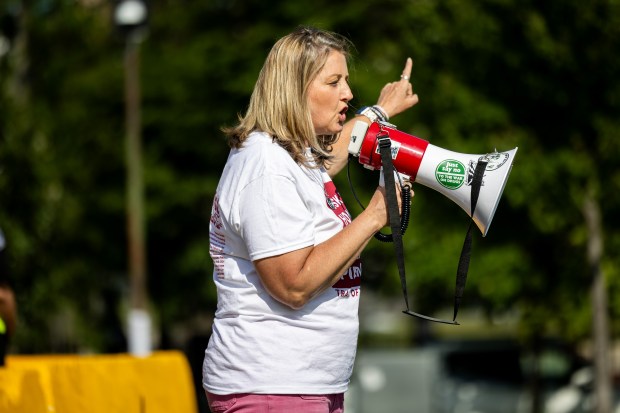
“Our message is important, it’s nonpartisan, and then they do this to us,” she said, gesturing around the empty park. “We try to follow their rules and play their games, and this is what we get for it. I said, this is what makes activists activists. You give us this fake (expletive) so then we go down there and take a megaphone and yell.”
As they stuck dozens of paper gravestones into the grass in front of the speaker’s platform, which were decorated with the faces and names of loved ones lost to opioid overdose, group members said they were trying to hold a “takeover” of the stage. They wanted to get speakers signed up for five slots in a row.
The city officials regulating sign-ins for the stage didn’t appear to appreciate it.
When she tried to sign up for a vacant 1 p.m. slot, Kathy Staples said she was told that she wasn’t allowed to speak. So she threw on a red shirt borrowed from her boyfriend to cover up her Trail of Truth top, and told them that she was speaking “as me, a person” to get a spot on stage.
As she spoke about her father and ex-husband’s struggles with substance abuse, about 10 activists, also in Trail of Truth shirts, sat in foldable camping chairs and cheered her on. They were the only audience.
Meanwhile, Michael Ott, who runs a political YouTube channel, walked around Park No. 578 with paper signs that warned about propaganda. His baseball cap read “Freedom, Equality, Fairness.”
Ott applied for a speaker’s slot six hours after the city’s deadline. They denied him, he said. He planned to go around the park speaking about his views anyway.
“I’m going to reach anybody that I can,” Ott said. “Just like the RNC, there’s hardly anybody around.”
During the Republican National Convention, the city of Milwaukee opened up its own amplified speakers’ platform near the convention center. According to Pleus, the format was very similar — including in that no one showed up to listen.
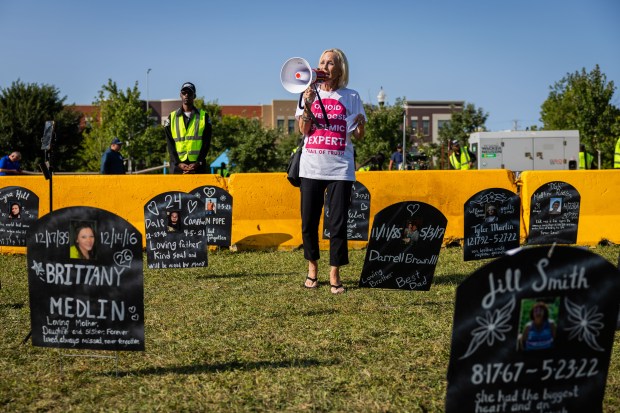
Faced with an empty audience on Wednesday while talking about how to fight the stigma around addiction, one speaker from Trail of Truth asked the security guards defending the platform, “Can you talk about this amongst your friends?”
About 50 people had been at Park No. 578 earlier that day for a news conference held by uncommitted delegates and other activists protesting the war in Gaza.
Michigan uncommitted delegate Abbas Alawieh, who led the event, said he had signed up to use the speaker’s platform, but hadn’t liked how the yellow concrete wall around it separated speakers from the audience. So he moved the gathering down to the grass, even though it meant speakers wouldn’t have a microphone.
Yet as noon rolled around and the first Trail of Truth speaker prepared to take the stage, the pro-Palestinian activists had to move elsewhere, and the large crowd left with them.
“I was hopeful when I came here, but it dissipated,” said Kim Durkee, a Trail of Truth board member who came to speak about her two daughters’ experiences with substance use disorder.
Many speakers said they’d thought that a speaking slot at the park during the DNC would be an opportunity to spread their message to a national audience.
They were then underwhelmed when they arrived at the deserted Park No. 578, which would only light up with action during larger scheduled protests.
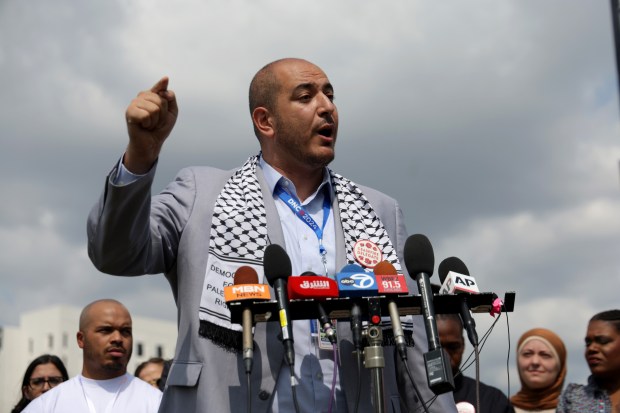
At 11 a.m. Tuesday, nurse and health care researcher Athena Lerch delivered the day’s first speech to a vacant park, speaking passionately about the importance of health equity as wind rustled the trees.
Lerch, who is working on a manuscript about racial disparities in health care, said she had hoped the speaker’s platform would act as a chance to communicate her work to policymakers.
Though she appreciated having the platform, she said she was disappointed about the lack of an audience.
“My project is focused on the South and West Side communities of Chicago, and I thought this was the best place to get this message out, because here we are on the West Side,” Lerch said. “There’s not a big audience here right now, but I was hoping to inspire people to tell them, hey, your voice matters.”
Ifetayo concluded his speech on reparations by urging the absent audience, “When I say reparations, you say now!” Yet the call-and-response was met with dead silence.
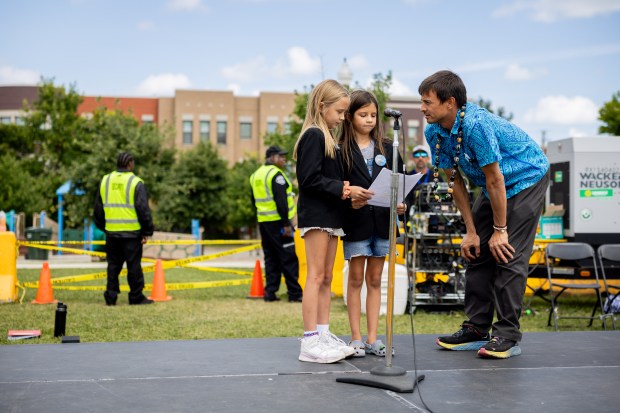
The only speakers perhaps relieved by the lack of a crowd were John Miller and his two daughters, Riley and Kailani, aged 8 and 10. The family from Hawaii spoke at noon on Tuesday regarding the importance of saving the whales, with the two young girls sharing a microphone and wearing matching black suit jackets.
Afterward, Miller said that he appreciated the small audience, since it created less pressure for his daughters’ first public speech.
“If we had the big crowds here, it might have been too much for their first talk,” Miller said. “But we got a couple reporters, and they got to do this, and this is an experience for them.”


